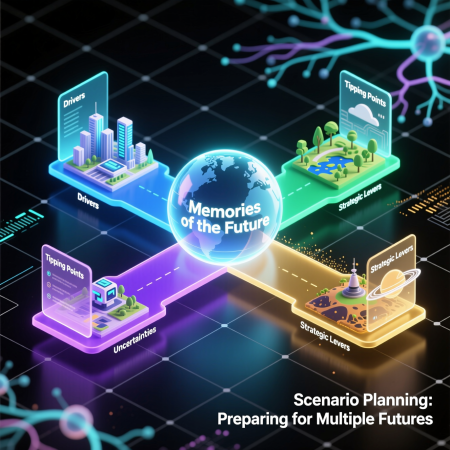“The greatest danger in times of turbulence is not the turbulence itself, but acting with yesterday’s logic.”

The future is an abstract concept through which humanity imposes a symbolic order on the present and meaning upon its past endeavors. Human strategy is often focused on structuring present activities within the framework of past experiences and future aspirations. Awareness of the future constitutes a dimension of human consciousness of time—the transient awareness of past, present, and future alike. This future awareness encompasses ordinary human capacities such as foresight and imagination regarding the future, enabling hopes and fears about it, as well as the ability to identify goals and plan accordingly. Such awareness involves thinking about the future, evaluating possible and diverse events and choices, and cultivating feelings, motivations, and attitudes toward what lies ahead. More broadly, awareness of the future comprises a complete set of ideas, visions, and theories that individuals hold about what is yet to come. In summary, future awareness can be understood as an integrated ensemble of psychological capacities, cognitive processes, and lived experiences that humans employ to engage with and comprehend the future.
Key psychological capabilities leveraged in futures studies include perception, learning, memory, thinking, and language. In industries characterized by long-term planning—particularly oil and energy companies—futures studies have become an undeniable necessity. Royal Dutch Shell is a pioneer in applying futures methodologies, especially scenario-based planning, in its long-term strategic frameworks.
Members of an organization collectively narrate stories about it, blending imagined future events with their own strategic intentions. Through this practice, they create simulated representations of potential futures and seek to shape those envisioned realities through their actions. These organizational narratives encapsulate individuals’ memories of past events, their observations of the current environment, and their expectations regarding how future developments might unfold. Embedded within a single narrative are objectives, purposes, initiatives, actions, intended and unintended consequences, causes, and ultimate aims—all unified within a coherent temporal framework.
Scenario-based planning is grounded in the premise that knowledge is a social, historical, and linguistic process. While many adherents of modernist paradigms argue that knowledge expressed through stories is only valid when those stories accurately and objectively depict reality, scenario planning views organizational narratives differently: they serve as a means of structuring communication through which individuals co-create imagined spatiotemporal contexts for themselves and their organization. These stories, situated within imagined space-time constructs, speak not of a single objective reality, but of multiple realities. Moreover, in scenario planning, language is not merely a tool for representing reality—it actively shapes reality itself.
Scenario planning is thus an endeavor to understand how the space of possibilities available to an organization is constrained by the interpretive/linguistic frameworks available to its members—and it offers a method for expanding those boundaries. The resulting scenarios create a discursive space that unfolds over time, enabling organizational members to interpret, reinterpret, and negotiate their own memories—particularly their “memories of the future”—and to anticipate forthcoming events.
This organizational discursive space seeks to reveal how diverse actors, each embodying multiple identities, might coexist and interact within a given future space-time context. By combining imagination with logic, scenario planning depicts plausible futures within which individuals’ decisions will eventually materialize. Equipped with such a tool, organizations can make decisions with significantly reduced regret and enhanced preparedness across a broader spectrum of possible futures. Scenario planning is, ultimately, a tool for mastering the future.

 فارسی
فارسی
